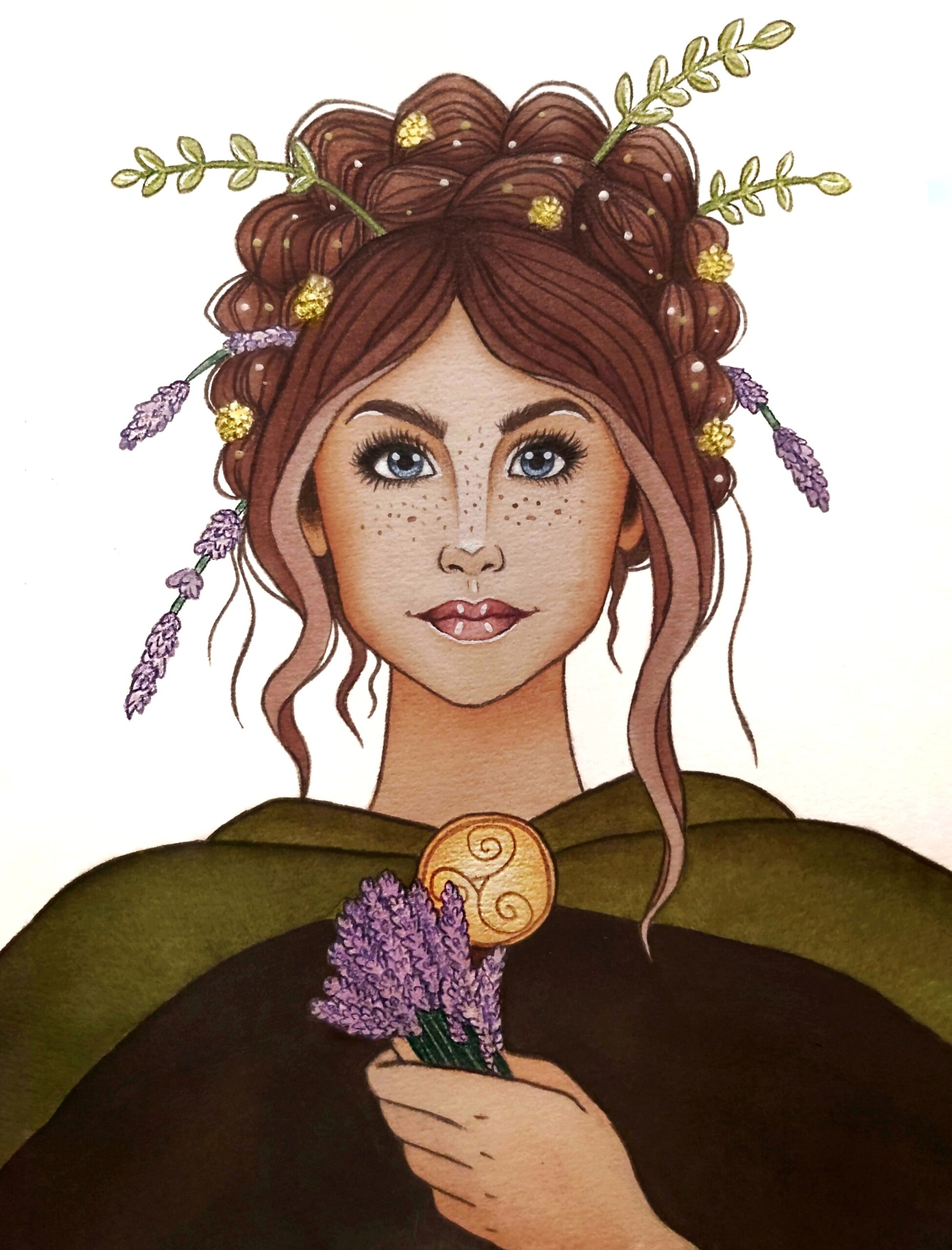Airmid: The Healing Goddess in Celtic Mythology
How Do Love Spells Work?
- Love spells focus intention, ritual, and natural energy (often herbs) to attract, restore, or strengthen love.
- Airmid—the Celtic Goddess of Healing—embodies herbal wisdom, compassionate restoration, and emotional renewal.
- Time-honored practices like sacred water, healing herbs, and spoken intention help manifest reconciliation and new romance.
- In this guide: Airmid’s myth, modern herbal magic, a step-by-step ritual, FAQs, and trusted links to real love spells that work.
- Ready to act now? Shop the full collection of love spells or get a reconciliation spell cast by a verified expert.
Airmid: Celtic Goddess of Healing, Herbal Wisdom & Divine Restoration
Airmid is honored in Celtic mythology as the Goddess of Healing and Medicinal Plants. A cherished member of the Tuatha Dé Danann, she represents renewal, herbal magic, and nature’s restorative power.
Daughter of Dian Cecht and sister to Miach, Airmid’s story reveals the roots of Celtic healing—sacred wells, herbcraft, and the enduring call to protect medicinal knowledge.
Take action now: Shop real love spells that work today or explore our Love Spells Collection. Prefer custom help? Get your spell cast by the best spell caster in the world.
Why Airmid Resonates Today
- Ancestral herbalist: Airmid’s mastery of medicinal plants bridges ancient tradition with modern holistic well-being.
- Healer’s spirit: She embodies compassion, rejuvenation, and the hope everyone seeks in times of heartache.
- Symbol of feminine wisdom: Her story honors grief, learning, and the cyclical rhythm of renewal.
Desire healing, self-love, or a restored relationship? Invite Airmid’s energy into your practice and pair herbal ritual with a focused intention—or choose a guided option like the Reconciliation Love Spell for expert support.
Watch: Discover Airmid—the Healing Goddess of the Celts
Origins & Divine Lineage: The Roots of Airmid’s Healing Power
Born of Dian Cecht—the great healer—and sibling to Miach, Airmid’s destiny is interwoven with medicine and earth wisdom. Her guardianship of herbs, springs, and sacred wells made her vital among the Tuatha Dé Danann.
Through Airmid’s lore, we learn a timeless lesson: when we tend the land, we heal the soul.

Artistic depiction: Airmid with fairies, spreading healing across worlds
Mythic Role: Airmid’s Healing Grace in Celtic Lore
Airmid is more than a keeper of herbs—she is the spirit of renewal itself. In the saga of King Nuada, who lost his arm in battle, Airmid and Miach crafted a miraculous silver limb and channeled the healing forces of the Well of Sláine to restore vitality to the Tuatha Dé Danann.
The Healing Miracle: Creation of the Well of Sláine
In Celtic tradition, sacred wells mark the threshold between mortal and divine. The Well of Sláine, brought forth through Airmid and Miach’s mastery, infused water with herbs, ritual, and love—becoming a sanctuary of profound healing.

Airmid blessing her healing collection of herbs by the holy spring
Destruction & Sorrow: The Loss of the Well
During the Battle of Moytura, enemies feared the Tuatha Dé Danann’s gifts and destroyed the Well of Sláine—casting stones into its waters and severing its power. Airmid grieved deeply, yet her resilience reminds us that compassion and wisdom cannot be erased.

Symbolic art: The Well’s healing energies disrupted by battle
Family Trial: Jealousy, Loss, and Airmid’s Sacred Knowledge
Airmid’s deepest wound arose within her own family. Jealous of Miach’s talent, Dian Cecht struck down his son. Grieving, Airmid gently arranged every medicinal herb by purpose—an act that would have transformed herbal medicine.
Tragically, her father scattered the carefully organized herbs, leading to knowledge lost to time. Yet the legend says Airmid still tends the wild fields—guiding healers, lovers, and those seeking restoration.

Airmid’s sacred healing secrets scattered to the winds
Airmid’s Legacy: The Mountain Healer
After heartbreak, Airmid retreated to the mountains—becoming a solitary guardian who aided fae folk, elves, and mortals. From quiet sanctuaries, she continued to teach compassion and the language of plants, inspiring modern seekers to heal love and life from the inside out.
How to Invoke Airmid’s Blessing for Love and Healing
Use this gentle ritual to call in renewal, reconciliation, and clarity. It blends herbal wisdom with intention—honoring the Goddess of Healing.
- Gather healing herbs (lavender, rosemary, rose petals) and a small white candle.
- Create a sacred space with a bowl of water to symbolize Airmid’s well.
- Speak your intention aloud—reconciliation, forgiveness, or manifesting true love. Need expert support? Consider the Reconciliation Love Spell.
- Offer gratitude to Airmid and place the herbs into the water. Return them to nature when finished.
For extra staying power in relationships, many practitioners pair this rite with a Love Binding Spell or a Bring Back Lost Lover Love Spell.
Sacred Herbs and Modern Love Magic
Practitioners of Celtic witchcraft and herbalism still look to Airmid as a guide. Using yarrow, mugwort, vervain, and valerian, many craft reconciliation or attraction rituals rooted in compassionate healing.
Honor Airmid by integrating healing herbs into your self-care and romantic practices—or follow a complete path with the Attract Your Soul Mate Spell for focused manifestation work.
Airmid’s Symbolism for the Heart
- Repair with hope: Meet brokenness with action and healing intention.
- Honor the full cycle: Let joy and sorrow both be teachers.
- Return to nature: Use earth’s rhythms to restore emotional balance.
Why Herbal Wisdom Amplifies Magic
Herbs carry living energy that harmonizes with your intention. Whether you’re mending a heart or calling in true love, blending plant allies with ritual helps anchor your desire in the natural world.
Need gentle emotional support? The Mend a Broken Heart Healing Love Spell can help you process grief and call in nurturing love.
Get Live Guidance from Gifted Advisors
Prefer real-time support? Connect with top psychics and love experts for clarity, timelines, and personalized steps.
Success Stories
⭐️⭐️⭐️⭐️⭐️
"Healing Love Spell Changed Everything!"
"After heartbreak, I tried the Mend a Broken Heart Healing Love Spell. It felt like Airmid herself was guiding me back to self-love and peace."
— Emily, Ireland
⭐️⭐️⭐️⭐️⭐️
"Love Rekindled with Ancient Power"
"I never thought a Celtic-inspired ritual could help my marriage. With guidance here, we found our way back to tenderness and trust."
— Liam, Edinburgh
⭐️⭐️⭐️⭐️⭐️
"Expert Guidance and Real Magic!"
"The advice about Airmid’s herbal magic made my Attraction Love Spell noticeably stronger. I felt renewed and confident."
— Fiona, Boston
Frequently Asked Questions about Airmid and Celtic Healing
- Who is Airmid in Celtic mythology?
- Airmid is the Irish goddess of healing and herbal wisdom, revered for restoring balance through plants, sacred wells, and compassionate magic.
- How does Airmid’s lore connect to modern love spells?
- Herbal magic under Airmid’s guidance supports emotional healing, reconciliation, and attraction—foundational energies for modern love rituals.
- What herbs are associated with Airmid?
- Yarrow, mugwort, vervain, St. John’s wort, lavender, and rose are commonly used for restoration, clarity, and heart-centered magic.
- Can I use Airmid’s energy to mend a relationship?
- Yes. Blend a simple water-and-herb rite with intention, or choose a guided spell like the Reconciliation Love Spell for expert support.
- What if I need fast results?
- Focus your intention and be consistent. Pair your ritual with a targeted spell such as a Love Binding Spell for added staying power.
About the Author
Spellcaster Belinda is a professional witch and herbal practitioner with 20+ years of experience in Celtic-inspired rituals, reconciliation work, and heart healing. She specializes in plant-based magic, compassionate counsel, and custom love spell casting for clients worldwide.
Belinda’s approach blends tradition with ethical practice, prioritizing free will, clarity, and results grounded in energetic alignment.
Embrace Airmid’s Healing Light in Your Life
Ready to restore your heart, reunite with a lover, or call in a soulmate? Let Airmid’s wisdom guide your next step. Act with intention today.
Explore the Love Spells Collection or choose a focused path with the Reconciliation Love Spell.
Begin Your Healing Journey Now🔴 Need Clarity on your Situation?



